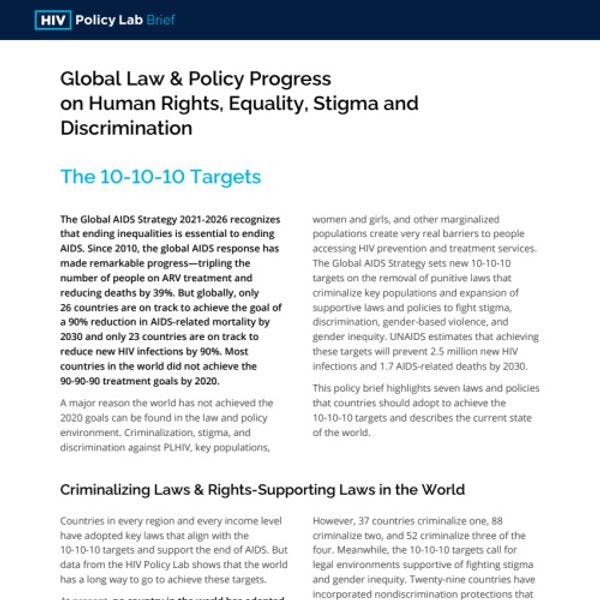HIV Policy Lab
Global law & policy progress on human rights, equality, stigma and discrimination
The Global AIDS Strategy 2021-2026 recognizes that ending inequalities is essential to ending AIDS. Since 2010, the global AIDS response has made remarkable progress—tripling the number of people on ARV treatment and reducing deaths by 39%. But globally, only 26 countries are on track to achieve the goal of a 90% reduction in AIDS-related mortality by 2030 and only 23 countries are on track to reduce new HIV infections by 90%. Most countries in the world did not achieve the 90-90-90 treatment goals by 2020.
At the High-Level Meeting on HIV/AIDS (June 8-10, 2021), UN member states will recommit to the goal of ending AIDS by 2030. The Political Declaration is expected to recognize the central role that inequalities, stigma and discrimination, and violence play in fueling the HIV pandemic and the necessity of reforming laws and policies that drive discrimination and undermine access to HIV prevention and treatment.
The Political Declaration follows on UNAIDS’ release of the Global AIDS Strategy 2021-2026: End Inequalities. End AIDS. At the core of the strategy, an ambitious new set of targets, the 10-10-10 targets, call on countries to repeal punitive laws/policies that target key populations and to implement supportive laws/policies that combat stigma, discrimination, and gender-based violence.
These targets will not be achieved without transparency, evidence, and accountability—transparency around the laws/policies that countries have in place, evidence to show why policy change is necessary and beneficial, and advocacy to hold governments accountable for acting on their commitments and achieving the 10-10-10 targets.
